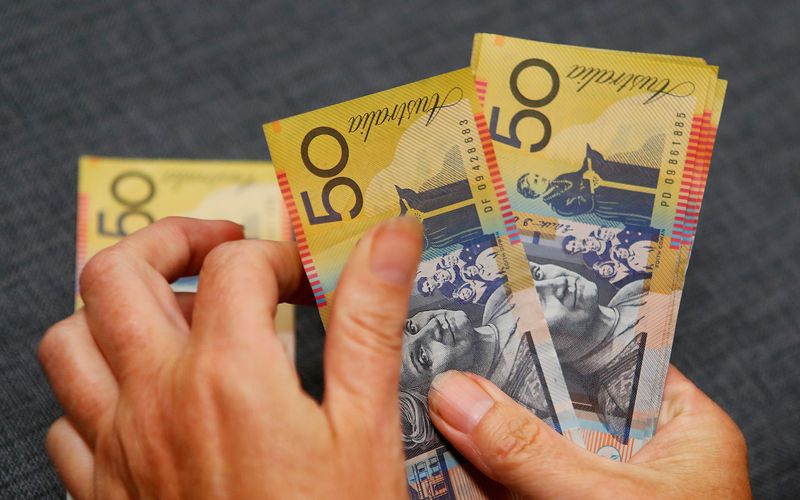LONDON (Reuters) - Major central banks are determined to clamp down on red-hot inflation, with Australia and New Zealand delivering further interest rate hikes this week.
A smaller-than-anticipated rate hike in Australia has fuelled talk that global monetary tightening will slow as the growth outlook turns.
For some, the debate is premature with the likes of the U.S. Federal Reserve unlikely to ease up on the brakes until inflation shows clear signs of slowing.
Central banks in the 10 big developed economies have raised rates by a combined 2,040 basis points (bps) in this cycle to date, with Japan the holdout "dove."
Here's a look at where policymakers stand in the race to contain inflation, from hawkish to dovish.
1) UNITED STATES
The Federal Reserve lifted rates by 75 bps on Sept. 21, vaulting the dollar index to a two-decade high. Fed Vice Chair Lael Brainard said on Sept. 30 that it would take time for tighter financial conditions to work through the economy and lower price pressures and until then, policy tightening was expected to remain.
The Fed's projections showed its policy rate rising to 4.4% by year-end, before peaking at 4.6% in 2023. Rate cuts are not expected until 2024.
2) CANADA
Money markets bet the Bank of Canada will raise its policy rate by 50 bps in October to 3.75%. The BoC will do whatever is needed to bring price increases back to target, a BoC official said last month.
On Sept. 7, the BoC hiked its policy rate to 3.25%, its highest level in 14 years. Canada was the first among the world's advanced economies in the current policy-tightening cycle to deliver a 100 bps rate.
3) NEW ZEALAND
The Reserve Bank of New Zealand on Wednesday delivered its eighth straight hike - and fifth consecutive rise of 50 bps - to lift rates to 3.5%, the highest in seven years.
The RBNZ even debated a larger 75 bps move given intense price pressures, in a reminder to markets that central banks remain very much in a hawkish mood.
4) BRITAIN
The Bank of England hiked interest rates by 50 bps last month and forecast a peak in inflation just below 11%, down from an earlier forecast of 13.3%.
But the prospect of entrenched double-digit inflation and the need for the BoE to tighten monetary policy has caused investors to raise their rate hike expectations. The new UK government's announcement last month of more tax cuts funded through borrowing has lifted those expectations even further -- markets are pricing in a hefty 100 bps hike in November.
5) NORWAY
Norway, the first big developed economy to kick off a rate-hiking cycle last year, on Sept. 22 raised its benchmark rate by 50 bps to 2.25%. The central bank said future hikes would be more "gradual", weakening the crown currency.
6) AUSTRALIA
The Reserve Bank of Australia delivered a smaller-than-anticipated 25 bps rate rise on Wednesday, saying it had raised rates substantially but further tightening would be necessary. Investors reacted by selling the Aussie dollar.
The RBA has delivered 250 bps of hikes, raising rates every month since May and pushing its key rate to a seven-year high of 2.60%.
7) SWEDEN
Sweden raised rates on Sept. 22 by a larger-than-expected one percentage point to 1.75% and warned of more to come over the next six months as it gets to grips with surging inflation.
The rate hike was the biggest since the inflation target was adopted in 1993, equalling the full percentage point hike of November 1992 during Sweden's domestic financial crisis when the main rate hit 500% for a short period.
8) EURO ZONE
The ECB was late to the hiking game but is catching up fast.
In September, the euro zone's central bank hiked rates by a record 0.75%, bringing its deposit rate to 0.75% and its main refinancing rate to 1.25%, their highest levels since 2011.
The ECB said it was "frontloading" policy to get a hold of inflation and it implied rate rises could continue into early 2023 even as the bloc braces for recession.
Money markets now price in around 70 bps of hikes in both October and December. They see rates peaking at over 2.8% in mid-2023, compared to 2.2% before the meeting.
9) SWITZERLAND
The Swiss National Bank (SNB) raised its policy rate last month by another 75 basis points to 0.5% from minus 0.25%, ending the negative rates experiment in Europe.
The bank also raised its inflation forecasts for 2022 and 2023 to 3% and 2.4% respectively, adding it couldn't rule out that further rate hikes will be needed to control inflation.
10) JAPAN
The Bank of Japan is the sole remaining policy dove has maintained its ultra-low interest rates and policy guidance.
Last month it reassured markets that it will continue to swim against a global tide of monetary policy tightening. But Japanese authorities also intervened to shore up the weak yen, which has been hurt by the policy divergence between Japan and the United States.
